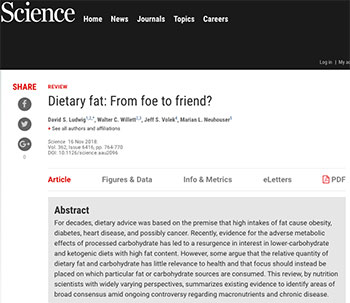 Now and again a truly seminal article pops up in the literature; we’ll be posting citations of particular interest to we in the Older Bolder crowd as they come across our radar.
Now and again a truly seminal article pops up in the literature; we’ll be posting citations of particular interest to we in the Older Bolder crowd as they come across our radar.
This one – Dietary Fat: From Foe to Friend? – published last month in Science (Science 16 Nov 2018:Vol. 362, Issue 6416, pp. 764-770), authored by David S. Ludwig, Walter C. Willett, Jeff S. Volek, and Marian L Neuhouser is one of those seminal pieces worth your time.
The authors take a concise look at the origins of the “reduce fats and increase carbohydrates” recommendations from purported authorities (dating in the piece back to 1977), and the resultant impacts on American health, while recognizing that correlation versus causation is open for debate, particularly given the plethora of factors impacting outcome and the lack of controlled, large human studies.
It’s most interesting to read their contrasting “The case for a low-fat, high-carbohydrate” and “The case for a low-carbohydrate, high-fat diet” sections, as well as the detailed arguments for dietary fat quality.
Their opening paragraph in the conclusion is worth noting (emphasis mine) –
The optimal proportion of carbohydrate to fat in the diet for obesity treatment and chronic disease prevention has been a topic of debate for decades, often generating more heat than light (101). Of course, any meaningful assessment of a diet’s impact on health must extend far beyond macronutrient quantity, to include the myriad qualitative aspects of food and food combinations that influence hormonal response, gene expression, and metabolic pathways. Further complicating this issue is the likelihood that inherent or acquired biological differences among individuals or populations, especially related to glucose homeostasis, affect response to specific diets.
The authors take care to note nine current controversies surrounding dietary fat, and appropriately call for further well-designed, thoughtfully controlled research in these arenas.
They also go on to list seven points of consensus, again from the article –
1. With a focus on nutrient quality, good health and low chronic disease risk can be achieved for many people on diets with a broad range of carbohydrate-to-fat ratios.
2. Replacement of saturated fat with naturally occurring unsaturated fats provides health benefits for the general population. Industrially produced trans fats are harmful and should be eliminated. The metabolism of saturated fat may differ on carbohydrate-restricted diets, an issue that requires study.
3. Replacement of highly processed carbohydrates (including refined grains, potato products, and free sugars) with unprocessed carbohydrates (nonstarchy vegetables, whole fruits, legumes, and whole or minimally processed grains) provides health benefits.
4. Biological factors appear to influence responses to diets of differing macronutrient composition. People with relatively normal insulin sensitivity and β cell function may do well on diets with a wide range of carbohydrate-to-fat ratios; those with insulin resistance, hypersecretion of insulin, or glucose intolerance may benefit from a lower-carbohydrate, higher-fat diet.
5. A ketogenic diet may confer particular metabolic benefits for some people with abnormal carbohydrate metabolism, a possibility that requires long-term study.
6. Well-formulated low-carbohydrate, high-fat diets do not require high intakes of protein or animal products. Reduced carbohydrate consumption can be achieved by substituting grains, starchy vegetables, and sugars with nonhydrogenated plant oils, nuts, seeds, avocado, and other high-fat plant foods.
7. There is broad agreement regarding the fundamental components of a healthful diet that can serve to inform policy, clinical management, and individual dietary choice. Nonetheless, important questions relevant to the epidemics of diet-related chronic disease remain. Greater investment in nutrition research should assume a high priority.
Well worth a read, and we’ll be diving into several of these key points in much greater detail in the upcoming months.



Leave a Reply